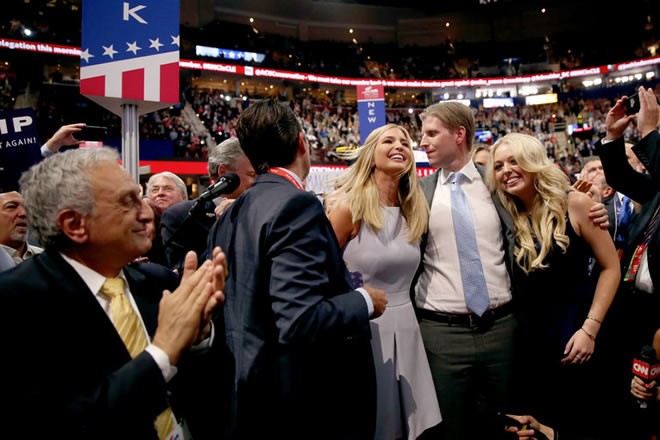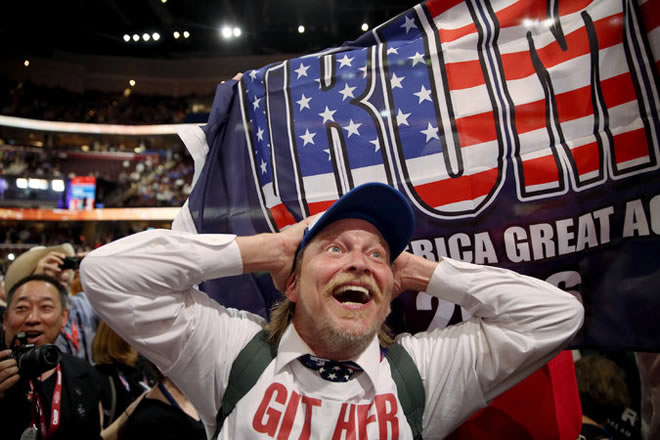
Wednesday, July 20, 2016
By Alexander Burns and Jonathan Martin

CLEVELAND — Donald J. Trump was formally crowned the Republican nominee for president at the party’s convention on Tuesday, ending a tumultuous primary season but not the nagging questions about his polarizing candidacy as he once again found himself embroiled in controversy.
With his campaign appearing in disarray after his wife, Melania, delivered a convention speech cribbed in part from one once given by Michelle Obama, Mr. Trump officially claimed the nomination. But the gap between Mr. Trump and the party he now aims to lead yawned as wide as ever across the convention.
At times, the only unifying appeals — the only themes truly capable of rallying the Republican Party, even briefly — were ominous denunciations of Hillary Clinton. Gov. Chris Christie of New Jersey, a Trump ally stung by his rejection in the hunt to be Mr. Trump’s running mate, rebounded with a call to arms against Mrs. Clinton.
Casting himself as her prosecutor in a mock trial, Mr. Christie roused the crowd to spontaneous chants of “Lock her up!”
But such moments of unity passed quickly in an evening that showcased the Republican Party’s crippling divisions from the start. In the roll call vote that began the night, formally marking Mr. Trump’s capture of the Republican nomination, 721 delegates cast their votes for candidates other than Mr. Trump — the most significant expression of party dissent since 1976, when Republicans had a contested convention.
And if more traditional Republicans in the audience showed limited enthusiasm for Mr. Trump, the misgivings were mutual: Senator Mitch McConnell of Kentucky, the majority leader, drew scattered boos from the crowd in multiple appearances on stage. Mr. McConnell, who has both endorsed Mr. Trump and criticized his campaign, offered a restrained embrace on Tuesday, stressing in his remarks that Mr. Trump would sign laws passed by the Republican-held Senate.
Speaker Paul D. Ryan, who was reluctant to endorse Mr. Trump, was more direct in his remarks over the party’s rift — what he called “our arguments this year.” But, Mr. Ryan said, “democracy is a series of choices.”
The mood of the event careened uneasily back and forth, from exultant celebrations cheered on by the Trump family to sober discourses on conservative policy guided by Republican congressional leaders to attacks on Mrs. Clinton.
While Mr. Ryan, representing the G.O.P.’s governing wing, laid out a vision for “a reformed tax code that rewards free enterprise,” Ben Carson, the physician who briefly caught fire last year in his presidential campaign, used part of his address to claim that Mrs. Clinton is a student of Saul Alinsky, the 20th-century activist and community organizer.
The roll call itself was punctuated with signals of discontent. When Ohio cast 66 delegate votes for its governor, John Kasich, a chorus of intermingled cheers and boos rose from the crowd. Mr. Kasich, a Republican, has not endorsed Mr. Trump and has been a pointed critic of his political style.
At another juncture in the roll call, another Republican governor who has not backed Mr. Trump, Susana Martinez of New Mexico, appeared poised to reconcile with the Republican nominee.
But as she stepped forward to cast her state’s votes, Ms. Martinez passed on a chance to publicly back Mr. Trump. Instead she passed the microphone to a young member of the New Mexico delegation, who spoke in her stead to hail Mr. Trump.

A man celebrated on the convention floor after it was announced that Mr. Trump had received enough votes for the party’s nomination. Credit Damon Winter/The New York Times
Alphabetically, Mr. Trump’s home state was next up, but it delayed casting its votes so that it would be the one that put Mr. Trump over the 1,237-delegate threshold. His son Donald Jr. announced on the convention floor that New York’s delegates had delivered the votes he needed.
“It’s not a campaign anymore, it’s a movement,” said the younger Mr. Trump, surrounded by his three adult siblings. Reflecting his father’s brashness, he pledged to put New York, which has not voted Republican in a presidential election in 32 years, in play.
The hall echoed with the strains of “New York, New York.” Giant screens hanging over the arena glittered with an animation of gold fireworks and a three-word proclamation: “Over the Top.”
Amid the celebration, some delegates remained seated and other seats on the floor were entirely empty. In big sections of the mezzanine, row upon row of red-backed seats stood mostly vacant.
The passionless tone that prevailed for most of the evening made Mr. Christie’s chest-thumping speech all the more noteworthy. For the second consecutive night, long stretches of the program were desultory, and the convention floor emptied out well before the speeches ended.
Having sputtered in his own run for the White House in 2016 and facing disappointment in his bid for second place on the ticket, Mr. Christie nevertheless gave the crowd his all.
Unlike in 2012, when Mr. Christie turned his keynote address at the Republican convention into a paean to his own political success, this time he spoke briefly of his friendship with Mr. Trump before savaging Mrs. Clinton as a criminal in all but name. It is time for the country to be led, he said, “not only by a strong leader, but by a caring, genuine and decent person.”
Still, there was unmistakable evidence that other prominent Republicans were eyeing 2020 campaigns with the expectation that the party would lose the White House this fall. While Mr. Trump was being formally nominated as the party’s standard-bearer, his most formidable rival from the primary campaign, Senator Ted Cruz of Texas, mingled with donors and activists at a reception in a restaurant across the street from the convention arena.
And as if to hand Republicans uneasy with Mr. Trump’s candidacy new reasons to be skeptical, his campaign offered a halting response on Tuesday to questions about why Ms. Trump’s speech featured passages from Mrs. Obama’s 2008 address at the Democratic convention. The controversy clouded the second day of the Republican convention and was a reminder that despite attempts to bolster his campaign, Mr. Trump continues to be plagued by stumbles.
Mr. Trump’s former campaign manager, Corey Lewandowski, said the staff member who succeeded him and helped engineer his ouster, Paul Manafort, should be terminated over the plagiarism. That suggestion prompted a harsh response from Donald Trump Jr., who suggested in a CBS interview that Mr. Lewandowski was trying to “maintain relevance.”
“There is a reason Paul is in the position that he is today and Corey is not, and it is not because Paul is amateur hour,” said the younger Mr. Trump.
It was all a headache for Republicans trying to rally support for Mr. Trump. “Some staffer screwed up. Let’s move on,” said Curt Smith, a Christian conservative leader in Indiana and close friend of Gov. Mike Pence, who was formally nominated as Mr. Trump’s running mate on Tuesday.
Asked if the campaign should take responsibility for the flap to bring questions to a halt, Mr. Smith shot back: “That would be good.”